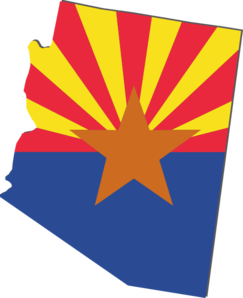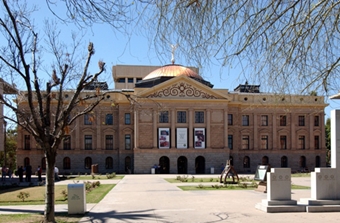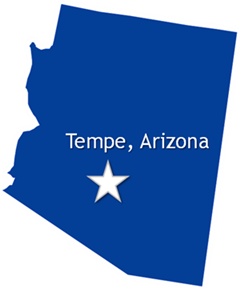September 1, 2016 •
Tempe, AZ Approves New Lobbying Law
On August 18, the city of Tempe, Arizona passed an ordinance creating a lobbying law. Ordinance No. O2016.46 creates a lobbyist registration program requiring an individual to file a registration statement with the city clerk within 10 calendar days. Lobbying […]
 On August 18, the city of Tempe, Arizona passed an ordinance creating a lobbying law.
On August 18, the city of Tempe, Arizona passed an ordinance creating a lobbying law.
Ordinance No. O2016.46 creates a lobbyist registration program requiring an individual to file a registration statement with the city clerk within 10 calendar days. Lobbying is defined as a communication with any public official for the purpose of influencing official action. Lobbyists are required to file annual expenditure reports covering a calendar year no later than January 31 following the reportable year.
The ordinance provides exceptions to registration, definitions, and other information relating to lobbyist disclosure and becomes effective on January 1, 2017.
Photo of the Tempe skyline by Schwnj on Wikimedia Commons.
May 19, 2016 •
Arizona Governor Signs More Campaign Finance Legislation
On May 18, Arizona Gov. Doug Ducey signed campaign finance legislation advancing the effective date of implementation of some of the changes to June of this year. House bills 2296 and 2297 complement Senate Bill 1516, another campaign finance bill […]
 On May 18, Arizona Gov. Doug Ducey signed campaign finance legislation advancing the effective date of implementation of some of the changes to June of this year. House bills 2296 and 2297 complement Senate Bill 1516, another campaign finance bill signed into law in March. The legislation also includes criminal penalties left out of the earlier Senate bill.
On May 18, Arizona Gov. Doug Ducey signed campaign finance legislation advancing the effective date of implementation of some of the changes to June of this year. House bills 2296 and 2297 complement Senate Bill 1516, another campaign finance bill signed into law in March. The legislation also includes criminal penalties left out of the earlier Senate bill.
The package of legislation is controversial among many because of the relaxation of disclosure by some entities involved in political activity.
May 9, 2016 •
Arizona Legislature Adjourns Regular Session
On May 7, the Arizona Legislature adjourned its 52nd, Second regular session sine die at 5:45 a.m. The governor has 10 days once the Legislature has adjourned to sign a bill into law, veto a bill, or do nothing and […]
 On May 7, the Arizona Legislature adjourned its 52nd, Second regular session sine die at 5:45 a.m. The governor has 10 days once the Legislature has adjourned to sign a bill into law, veto a bill, or do nothing and allow it to become law without his or her signature. The governor does not have a pocket veto. The Legislature can override a governor’s veto with a vote of two-thirds of its members.
On May 7, the Arizona Legislature adjourned its 52nd, Second regular session sine die at 5:45 a.m. The governor has 10 days once the Legislature has adjourned to sign a bill into law, veto a bill, or do nothing and allow it to become law without his or her signature. The governor does not have a pocket veto. The Legislature can override a governor’s veto with a vote of two-thirds of its members.
Signatures are being collected to put a campaign finance initiative on the Arizona state ballot this November. The initiative, filed on April 12 by Arizonans for Clean and Accountable Elections, is in response to Senate Bill 1516, a recently passed […]
 Signatures are being collected to put a campaign finance initiative on the Arizona state ballot this November.
Signatures are being collected to put a campaign finance initiative on the Arizona state ballot this November.
The initiative, filed on April 12 by Arizonans for Clean and Accountable Elections, is in response to Senate Bill 1516, a recently passed campaign finance bill taking effect in 2017. “Our initiative addresses the most egregious parts of [Senate Bill] 1516,” said Samantha Pstross, the chairperson of committee putting forth the issue, according to the Herald Dispatch.
Senate Bill 1516 allows groups registered with the IRS as social welfare organizations to withhold disclosing donor information, removes spending caps on expenditures for political fundraisers, and allows for candidate-to-candidate transfers of campaign funds. The initiative increases disclosure of political activity, lowers contribution limits, and prevents contributions between candidates. Additionally, lobbyists would be required to disclose all meals purchased for elected officials and would be prohibited from paying travel expenses for them, according to the Herald Dispatch.
State law requires 150,000 valid signatures to have the initiative placed on the November ballot.
April 4, 2016 •
AZ Governor Signs Campaign Finance Law
On March 31, a bill overhauling campaign finance passed by the Arizona Legislature was signed into law by Gov. Doug Ducey. Among the changes to the state’s law, Senate Bill 1516 allows groups registered with the IRS as “social welfare” […]
 On March 31, a bill overhauling campaign finance passed by the Arizona Legislature was signed into law by Gov. Doug Ducey. Among the changes to the state’s law, Senate Bill 1516 allows groups registered with the IRS as “social welfare” organizations to withhold disclosing donor information, removes spending caps on expenditures for political fundraisers, and allows for candidate to candidate transfers of campaign funds.
On March 31, a bill overhauling campaign finance passed by the Arizona Legislature was signed into law by Gov. Doug Ducey. Among the changes to the state’s law, Senate Bill 1516 allows groups registered with the IRS as “social welfare” organizations to withhold disclosing donor information, removes spending caps on expenditures for political fundraisers, and allows for candidate to candidate transfers of campaign funds.
“When it comes to free speech and participation in the democratic process, our laws should reflect the goal of making it easier for more citizens to engage. That’s what this reform package does,” the Albuquerque Journal reports Ducey as saying. The law becomes effective January 1, 2017.
March 30, 2016 •
Arizona Bill Changes State’s Campaign Finance Laws
On March 29, a bill overhauling campaign finance was passed by the Arizona Legislature. Among the changes to the state’s law, Senate Bill 1516 allows groups registered with the IRS as “social welfare” organizations to withhold disclosing donor information, removes […]
 On March 29, a bill overhauling campaign finance was passed by the Arizona Legislature. Among the changes to the state’s law, Senate Bill 1516 allows groups registered with the IRS as “social welfare” organizations to withhold disclosing donor information, removes spending caps on expenditures for political fundraisers, and allows for candidate to candidate transfers of campaign funds.
On March 29, a bill overhauling campaign finance was passed by the Arizona Legislature. Among the changes to the state’s law, Senate Bill 1516 allows groups registered with the IRS as “social welfare” organizations to withhold disclosing donor information, removes spending caps on expenditures for political fundraisers, and allows for candidate to candidate transfers of campaign funds.
While the lack of requiring disclosure of political donors was a major objection from state legislators opposed to the bill, the majority of the Legislature was willing to accept the changes. “I think transparency is a good principle. But it is not the overarching principle,” said bill supporter Rep. J.D. Mesnard, as reported by the Arizona Daily Star. If not vetoed by Gov. Doug Ducey, the law becomes effective January 1, 2017.
January 12, 2016 •
AZ Secretary of State Proposes Campaign Finance Law Revisions
On January 8, the Arizona Secretary of State’s office proposed changes to the state’s campaign finance law in order to make it simpler and easier to understand. Changes include revisions of the definitions of committee and election cycle and elimination […]
 On January 8, the Arizona Secretary of State’s office proposed changes to the state’s campaign finance law in order to make it simpler and easier to understand. Changes include revisions of the definitions of committee and election cycle and elimination of the “paid for” disclosures in campaign messages on social media, according to The Arizona Republic.
On January 8, the Arizona Secretary of State’s office proposed changes to the state’s campaign finance law in order to make it simpler and easier to understand. Changes include revisions of the definitions of committee and election cycle and elimination of the “paid for” disclosures in campaign messages on social media, according to The Arizona Republic.
“We are keeping almost every existing policy, but we have rewritten it in a simpler manner. We have reorganized it to the place where you would expect to find it. And we have created the statutes like the way you would read a book,” said Director of Election Services Eric Spencer, according to KJZZ.org. The office has drafted legislation to be considered by the Legislature this year.
November 19, 2015 •
Campaign Finance Question on Tempe, AZ Ballot in 2016
On November 12, the Tempe, Arizona City Council passed an ordinance that could limit political contributions to city candidates. Pursuant to the city’s charter, the ordinance will only be effective if passed by voters at a March 8, 2016, special […]
 On November 12, the Tempe, Arizona City Council passed an ordinance that could limit political contributions to city candidates. Pursuant to the city’s charter, the ordinance will only be effective if passed by voters at a March 8, 2016, special election and after approval by the governor. Among the changes in the ordinance, contributions for mayor and councilmembers would be limited to $500 from individuals and $1,000 from any PAC or single partnership. The limits would be adjust biennially to the nearest $10 by the percentage change in the consumer price index. If passed, the limitations on candidate contributions for city elected office will begin with the 2018 election cycle.
On November 12, the Tempe, Arizona City Council passed an ordinance that could limit political contributions to city candidates. Pursuant to the city’s charter, the ordinance will only be effective if passed by voters at a March 8, 2016, special election and after approval by the governor. Among the changes in the ordinance, contributions for mayor and councilmembers would be limited to $500 from individuals and $1,000 from any PAC or single partnership. The limits would be adjust biennially to the nearest $10 by the percentage change in the consumer price index. If passed, the limitations on candidate contributions for city elected office will begin with the 2018 election cycle.
November 2, 2015 •
Arizona Special Session Adjourns
On October 30, 2015, the Arizona Legislature adjourned its special session after lawmakers agreed on educational funding for the state. Gov. Doug Ducey immediately signed the legislation into law, which also creates a special election on May 17, 2016, to […]
 On October 30, 2015, the Arizona Legislature adjourned its special session after lawmakers agreed on educational funding for the state. Gov. Doug Ducey immediately signed the legislation into law, which also creates a special election on May 17, 2016, to enact constitutional changes required by the funding reforms. “Educators will finally have the resources they have been asking for, and our students will have greater opportunities to succeed,” Ducey said in a press release.
On October 30, 2015, the Arizona Legislature adjourned its special session after lawmakers agreed on educational funding for the state. Gov. Doug Ducey immediately signed the legislation into law, which also creates a special election on May 17, 2016, to enact constitutional changes required by the funding reforms. “Educators will finally have the resources they have been asking for, and our students will have greater opportunities to succeed,” Ducey said in a press release.
October 29, 2015 •
Arizona Special Session Called
On October 28, 2015, Arizona Gov. Doug Ducey called a special session of the Legislature to meet on the same day at 8 p.m. In anticipation of the session, lawmakers had met to create bills dealing with education funding in […]
 On October 28, 2015, Arizona Gov. Doug Ducey called a special session of the Legislature to meet on the same day at 8 p.m. In anticipation of the session, lawmakers had met to create bills dealing with education funding in the state and to authorize a special election for the May 2016 consolidated election date. Once the bills were ready, Ducey issued the proclamation for a special session and tweeted a picture of the proclamation on his twitter account.
On October 28, 2015, Arizona Gov. Doug Ducey called a special session of the Legislature to meet on the same day at 8 p.m. In anticipation of the session, lawmakers had met to create bills dealing with education funding in the state and to authorize a special election for the May 2016 consolidated election date. Once the bills were ready, Ducey issued the proclamation for a special session and tweeted a picture of the proclamation on his twitter account.
Photo of the Arizona State Capitol by Jeff Dean on Wikimedia Commons.
April 6, 2015 •
Arizona Legislature Adjourns
On April 3, the Arizona Legislature adjourned its regular session sine die. Gov. Doug Ducey has until April 15 to sign or veto legislation. The governor does not have a pocket veto. Photo of the Arizona State Capitol by Jeff […]
 On April 3, the Arizona Legislature adjourned its regular session sine die.
On April 3, the Arizona Legislature adjourned its regular session sine die.
Gov. Doug Ducey has until April 15 to sign or veto legislation.
The governor does not have a pocket veto.
Photo of the Arizona State Capitol by Jeff Dean on Wikimedia Commons.
January 22, 2015 •
AZ SOS Encourages Campaign Finance Compliance While Court Case Continues
In a statement regarding the impact of a recent district court order, the Arizona Office of the Secretary of State said it is not currently enforcing the compliance provisions of campaign finance law. In December, the United States District Court […]
 In a statement regarding the impact of a recent district court order, the Arizona Office of the Secretary of State said it is not currently enforcing the compliance provisions of campaign finance law.
In a statement regarding the impact of a recent district court order, the Arizona Office of the Secretary of State said it is not currently enforcing the compliance provisions of campaign finance law.
In December, the United States District Court for the District of Arizona ruled A.R.S. §16-901(19), the definition of political committee, unconstitutional. A motion to stay the case, Galassini v. Town of Fountain Hills, was filed by the Arizona Attorney General’s Office to maintain the current application of campaign finance law while an appeal is being filed with the Ninth Circuit, according to the secretary of state.
However, the secretary of state “strongly encourages all political committees to adhere to the statutory requirements until a final resolution is obtained to prevent any unforeseen challenges if the appeal is successful”.
January 22, 2015 •
AZ Bill Would Require Reporting of the Compensation of Lobbyists
Rep. Debbie McCune Davis has introduced a bill in the statehouse requiring lobbyists registered in Arizona to report their compensation. House Bill 2136 amends the Arizona lobbying law by requiring every lobbyist, including a lobbyist for compensation, authorized lobbyist, authorized […]
 Rep. Debbie McCune Davis has introduced a bill in the statehouse requiring lobbyists registered in Arizona to report their compensation.
Rep. Debbie McCune Davis has introduced a bill in the statehouse requiring lobbyists registered in Arizona to report their compensation.
House Bill 2136 amends the Arizona lobbying law by requiring every lobbyist, including a lobbyist for compensation, authorized lobbyist, authorized public lobbyist, designated lobbyist, and designated public lobbyist, to file a statement of compensation paid to the lobbyist for lobbying activities at the same time quarterly expenditure reports are due. Currently a lobbyist’s salary is not reported.
Photo of the Arizona State Capitol by Jeff Dean on Wikimedia Commons.
December 22, 2014 •
Arizona Citizens Clean Elections Commission Issues Statement Regarding Galassini Ruling
On December 19, the Arizona Citizens Clean Elections Commission issued a statement regarding the court ruling earlier this month invalidating the statutory definition of political committee. On December 5, a federal judge declared the state’s definition of political committee “vague, […]
 On December 19, the Arizona Citizens Clean Elections Commission issued a statement regarding the court ruling earlier this month invalidating the statutory definition of political committee. On December 5, a federal judge declared the state’s definition of political committee “vague, overbroad, and consequently unconstitutional in violation of the First Amendment.” In Galassini v. Town of Fountain Hills, Senior District Judge James A. Teilborg of the United States District Court for the District of Arizona, relied on his prior determination finding A.R.S. §16-901(19) unconstitutional.
On December 19, the Arizona Citizens Clean Elections Commission issued a statement regarding the court ruling earlier this month invalidating the statutory definition of political committee. On December 5, a federal judge declared the state’s definition of political committee “vague, overbroad, and consequently unconstitutional in violation of the First Amendment.” In Galassini v. Town of Fountain Hills, Senior District Judge James A. Teilborg of the United States District Court for the District of Arizona, relied on his prior determination finding A.R.S. §16-901(19) unconstitutional.
In its statement, the commission says, “We strongly recommend that candidates and other persons who participate financially in state and legislative candidate elections continue to make filings as required by law, subject to enforcement under the Clean Elections Act and Rules.”
State and Federal Communications, Inc. provides research and consulting services for government relations professionals on lobbying laws, procurement lobbying laws, political contribution laws in the United States and Canada. Learn more by visiting stateandfed.com.


